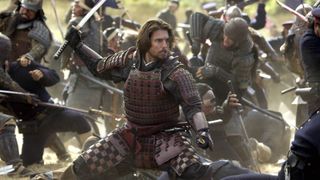Samurai movies have long fascinated film fans since the genre first emerged from Japan in the early '20s, and it's pretty understandable why. It's a genre that lends itself to a myriad of stories. As such, the best Samurai movies can tell a thrilling tale of honorable warriors teaming up to take on brutish bandits or be a more reflective Shakespearean-inspired tragedy about class and human nature. Simply put, there's so much more to the best samurai movies than vicious duels with razor-sharp swords (although there's plenty of action for those who prefer their movies with a little edge).
Of course, as far as film genres go, getting into samurai movies can be a daunting task, even for those who know their way around a cinema aisle. Part of the problem is that it's a genre so easily dominated by just a handful of legendary names – we've tried hard to ensure that this isn't just a low-key best Akira Kurosawa movies list. So strap in as we take you on a journey across lush landscapes and brutal battlefields, exploring the 10 best Samurai movies which will help you explore honor, revenge, and the indomitable spirit of the samurai.
10. The Last Samurai
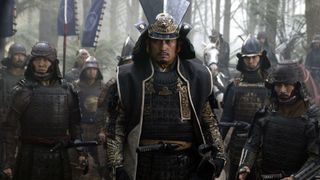
Director: Edward Zwick
Released: 2003
The Last Samurai is an absolutely gorgeous and surprisingly reflective picture set during the waning days of the samurai class in Japan. The story centers on Captain Nathan Algren (Tom Cruise), an American soldier who travels to Japan to train the emperor's new army and quash a samurai rebellion. However, Algren's loyalties are split when he's captured by Lord Moritsugu Katsumoto (Ken Watanabe), the man leading the revolt, and the pair form an odd bond. Boasting some incredibly choreographed action scenes and John Toll's impeccable cinematography, The Last Samurai is so pretty to watch that you'll want to frame it. In more recent years, the film has been criticized for its white savior narrative. However, Watanabe has credited the movie with breaking stereotypes around the portrayal of Asian people in Western cinema.
9. 13 Assassins
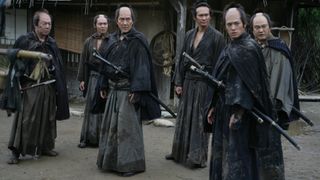
Director: Eiichi Kudo
Released: 2010
A remake of the 1963 film of the same name, 13 Assassins, is an exciting and terrifically ambitious movie that manages to balance impressive spectacle and superb storytelling. Set in the late Edo period, the film tells the story of thirteen men who come together to stop a corrupt lord from seizing political power by any means necessary. What makes the film stand out is its excellent cast of intriguing characters, thrilling plot and director Takashi Miike's incredible ability to keep the focus on the story even amidst spectacle – a skill that's put to good use during the film's final act when a battle so breathtaking in scale breaks out that would put Peter Jackson did with Helm's Deep to shame.
8. Yojimbo
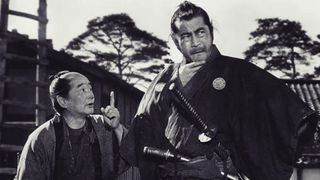
Director: Akira Kurosawa
Released: 1961
While it might not be Akira Kurosawa's most celebrated work, Yojimbo – the tale of a ronin, Sanjuro Kuwabatake, who two corrupt businessmen into a gang war – is a gripping action and entertaining action film that's elevated by the incredible central performance of Toshiro Mifune. Mifune lends Sanjuro an easy charm that makes him an incredibly compelling hero, while his sardonic edge gives the film a dark sense of humor. While it may not have the cultural cache of something like Seven Samurai, Yojimbo feels like an incredibly modern movie, and its influence can be seen in films like John Wick, Star Wars and, of course, the work of Sergio Leone. In fact, Fistful of Dollars is basically an unauthorized Western remake.
7. The Sword Of Doom
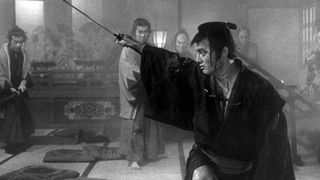
Director: Kihachi Okamoto
Released: 1966
Film names don't come cooler than this, but the sheer awesomeness of The Sword Of Doom's title belies its bloodthirsty and challenging story. The film follows Ryunosuke Tsukue (Tatsuya Nakadai), an amoral and savage samurai whose skill with the blade is only matched by his cruelty as he descends into insanity. A genuinely shocking piece of cinema, The Sword of Doom is best remembered for its main character's brutality and its startling scenes of violence. Still, if you can put up with its viciousness, you'll be delighted by Hiroshi Murai's haunting cinematography and an incredible performance from Tatsuya.
6. The Hidden Fortress
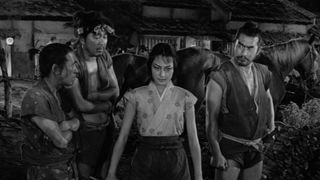
Director: Akira Kurosawa
Released: 1958
A relatively light-hearted take on the samurai genre, The Hidden Fortress is a lively adventure film that balances bold heroic hijinks with touching drama and high-stakes thrills. The plot centers on Matashichi (Kamatari Fujiwara) and Tahei (Minoru Chiaki), two squabbling peasants who are convinced by the offer of gold to take Rokurota (Toshirô Mifune) and Yuki (Misa Uehara) across enemy lines never realizing they're actually escorting an important general and princess. A first-rate film, The Hidden Fortress proves Kurosawa is as comfortable in the world of funny action romps as he is in the world of high drama. Still, these days, The Hidden Fortress is probably best known as the film that inspired George Lucas to make one of the best sci-fi movies of all-time – a little-known film called Star Wars.
5. Harakiri
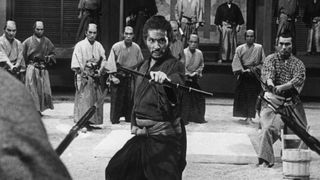
Director: Masaki Kobayashi
Released: 1962
A revenge thriller and tragedy about the ridiculousness of putting honor above all else, Harakiri is arguably director Masaki Kobayashi's finest film. The film tells the story of Hanshirō Tsugumo (Tatsuya Nakadai), a ronin seeking death who goes out of his way to humiliate the local feudal lord before committing seppuku (also known as harakiri). While Harakiri's melancholy tone means it lacks the cathartic 'oomph' of similar revenge-driven films on this list, the human drama at the heart of its story makes it no less gripping, and its anti-authoritarian themes give it an incredible sense of timelessness.
4. Throne of Blood
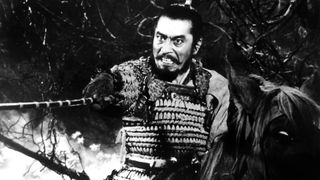
Director: Akira Kurosawa
Released: 1957
A haunting retelling of William Shakespeare's Macbeth, Throne of Blood swaps the chilly highlands of Scotland for the misty mountains of Japan. Our hero (although we use that word lightly) is Taketoki Washizu (Toshiro Mifune), an ambitious general who's convinced to kill his master in the hopes of usurping him as Lord of Spider's Web Castle. If you've seen Macbeth, you probably know things don't work out for Washizu, but just because you know the story doesn't mean you should skip this masterful work from director Akira Kurosawa. It's been called one of the greatest adaptations of Shakespeare's work ever, and it's easy to see why. Its story about the folly of greed is undoubtedly great, but what separates this film from other adaptations are its evocative visuals, unsettling atmosphere, and Mifune's bold performance.
3. Lady Snowblood
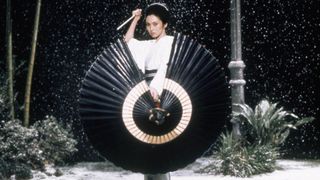
Director: Toshiya Fujita
Released: 1973
As stylish as it is iconic, Lady Snowblood is one of the few samurai movies with a female lead, specifically Yuki (Meiko Kaji), a young woman seeking revenge on the men who murdered her family. A wildly entertaining film, Lady Snowblood's violent action scenes are at odds with its pointed message about the cyclical nature of revenge. These themes and its non-linear narrative give Lady Snowblood an incredibly modern feel, making it one of this list's more easily digestible films. Indeed, those familiar with the work of Quentin Tarantino will probably get a real kick out of this film, as it's what inspired Kill Bill.
2. Ran
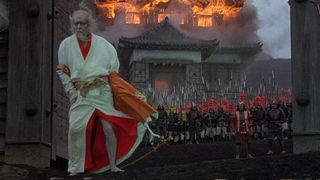
Director: Akira Kurosawa
Released: 1985
Succession with samurai, Ran is another Shakespeare adaptation from Akira Kurosawa. This time, the great director has turned the tragedy of King Lear into an epic war movie about the destructive nature of ambition. Tatsuya Nakadai stars as Ichimonji Hidetora, a once-powerful warlord who chooses to divide his lands between his three sons, Taro, Jiro, and Saburo. As the boys fight to become the undisputed leader of their father's domain, Hidetora is slowly driven mad by the destruction of his family. Visually stunning and beautiful in its bloodiness, Ran is a technical masterwork and the perfect showcase for Kurosawa's filmmaking genius. Still, while Ran is epic in every sense of the word, what makes it such a powerful feature is the fact it never puts spectacle over the unfolding human tragedy at the center of its story.
1. Seven Samurai
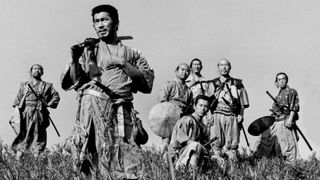
Director: Akira Kurosawa
Released: 1954
Akira Kurosawa's best-known work and arguably his greatest film, Seven Samurai, balances the thrills of a classic adventure movie with the sweeping scale of the grandest epics. Set during the Sengoku period, the film follows Kambei Shimada (Takashi Shimura), a ronin tasked with gathering a group of samurai to defend a village from bandits. The strength of Seven Samurai lies in its simple but exciting plot and cast of memorable characters. Indeed, the film's story is so strong that if we listed all the times, it's been adapted, remade, and at some point blatantly ripped off, we'd run out of digital ink.
There aren't all that many upcoming movies in the Samurai genre these days, but perhaps you'll find something else to watch in our list of the best action movies or best thrillers on Netflix.
